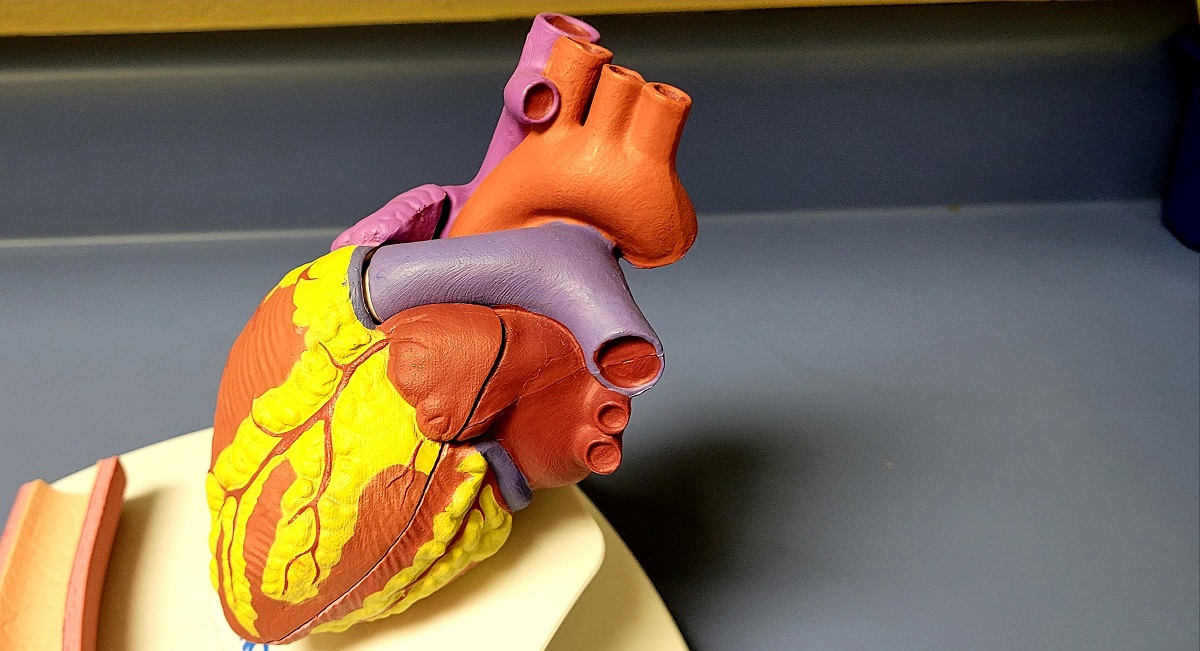A health condition in which the thickness of the heart muscle occurs is called hypertrophic cardiomyopathy (HCM). Sometimes, doctors say that the heart muscle is hypertrophied. Once HCM happens, it becomes hard for the heart to pump blood.
Furthermore, many people have this condition but do not know about it because it causes few or even no symptoms. Only a few people with HCM experience serious symptoms including shortness of breath and chest pain. However, some people with hypertrophic cardiomyopathy experience certain changes in the electrical signals of the heart which may lead to life-threatening irregular heartbeats or sudden death.
Symptoms
People with HCM may experience one or more symptoms listed below. For example:
- Chest pain (mostly occurs during exercise)
- Fainting (often happens just after exercise or other physical activity)
- Pounding or fluttering heartbeats (also called palpitations)
- Breathing problems
However, there are multiple health problems that cause shortness of breath and palpitations. That’s why it is important to visit a doctor for a prompt diagnosis and care. You should get regularly checked for hypertrophic cardiomyopathy if you have a family history of the disease.
Go to the nearest emergency room or call 911 immediately if any of the following symptoms occur. For example irregular or fast heartbeat, trouble breathing, or chest pain (angina).
Causes
The primary cause of HCM is a mutated (changed) gene that causes the heart muscle to become thick. This condition usually negatively affects the walls (septum) between the bottom heart’s chambers. Heart chambers are also called the ventricles. When the wall between the ventricles becomes thickened, it may block the blood flow out of the heart. In such cases, this condition is called obstructive hypertrophic cardiomyopathy.
In case it is not significant blood flow blocking, the condition is called non-obstructive hypertrophic cardiomyopathy. However, the primary heart’s pumping chamber (also called the left ventricle) may become stiff making it difficult for the heart to relax. Moreover, stiffness also may reduce the amount of blood the ventricle can hold and send to the body during each heartbeat.
Sometimes, people may experience irregular heartbeats because the muscle of the heart is arranged differently in people with HCM. In such cases, it is called myofiber disarray.
Risk Factors
Commonly, this condition runs in families, which means it passes from biological parents to biological children. However, people with one parent with HCM have a 50% chance of getting the abnormal gene that causes the condition.
If you have a parent or a sibling with hypertrophic cardiomyopathy, it is advised to visit a doctor for testing.
What Are The Possible Complications of Hypertrophic Cardiomyopathy?
People who do not get treatment and ignore the symptoms may experience some unpleasant and sometimes life-threatening complications. These include:
- Blocked blood flow – The blood flow that leaves the heart is blocked in many people with HCM. This complication may cause fainting, dizziness, chest pain, and shortness of breath.
- Atrial fibrillation (AFib) – Fast and irregular heartbeats are called AFib and can be triggered by heart muscle thickness. Atrial fibrillation also increases the risk of blood clots.
- Mitral valve disease – When the blood flow that leaves the heart is blocked, the valve between the heart’s left chambers may not close properly. Therefore, mitral valve disease happens.
- Dilated cardiomyopathy – This complication occurs quite rarely in people with HCM. When it happens, weakness of the heart muscle occurs and the heart begins to pump blood with less force.
- Heart failure – Stiffness of the heart muscle may happen in people who experience HCM for long periods. Thus, the heart cannot pump enough blood for the body’s needs.
- Fainting (syncope) – Blockages of the blood flow and irregular heartbeats may cause fainting.
- Sudden cardiac death – This is a rare complication that may occur in people with HCM. However, it often happens suddenly as people do not realize they have it. It may occur even in healthy young people (such as high school athletes).
Prevention
Unfortunately, there is no way to prevent this condition but with early diagnosis and treatment, you can prevent complications and lessen the symptoms.
The only way to know if your children will have this condition is through genetic testing before pregnancy. This test helps determine whether you have this abnormal gene or not. However, if genetic testing is not helpful, doctors may recommend performing echocardiograms. Moreover, this test is recommended for all people with a family history of HCM.
Diagnosis
Doctors before diagnosing this condition will listen to your heart using a stethoscope. They also will ask some questions about symptoms and your family history. The following tests are usually done to confirm HCM. For example:
- Echocardiogram – This test is frequently used to diagnose HCM and it uses sound waves to make pictures of the beating heart. It may show how well the heart’s chambers and valves pump blood.
- Electrocardiogram (ECG or EKG) – EKG is a test that measures the electrical activity of the heart and it is performed quickly.
- Holter monitor – This is a special device that works such as EKG and it records the heart’s activity during the day.
- Cardiac MRI – This is an imaging test that uses a magnetic field and radio waves to produce detailed images of the heart. Commonly, it is performed along with an echocardiogram.
- Stress test – During this test, doctors will monitor your heart while you are walking on a treadmill or riding a stationary bike.
- Cardiac CT scan – Sometimes, this test is used to diagnose HCM.
Treatment
The treatment goal is to lessen the symptoms and prevent sudden cardiac death. Doctors usually prescribe different treatments for people with HCM because it depends on several factors including severity of the condition, age, and others. Check below some treatment options recommended by doctors for people with HCM:
Medicines
The following medicines help to reduce the symptoms such as fast heart rate. For example:
- Beta-blockers – These include metoprolol, Propranolol, or Atenolol
- Calcium channel blockers – Such as Verapamil or Diltiazem
- Mavacamten – This is an effective medicine for people with HCM. It helps lessen the strain on the heart. Doctors usually recommend this medicine for people who cannot take beta-blockers or calcium channel blockers.
- Heart rhythm medications – For example Amiodarone or Disopyramide
- Blood thinners (anticoagulants) – These include Warfarin, Dabigatran, Rivaroxaban, or Apixaban. Previous medications help prevent blood clots, especially if you have atrial fibrillation.
Other Treatment Options
- Septal myectomy – This is an open-heart surgery used when medications do not work. This procedure helps improve blood flow out of the heart and decreases the backward flow of blood through the mitral valve.
- Septal ablation – This is a procedure in which doctors use alcohol to shrink the thickened heart muscle. The alcohol is delivered through a long and thin tube.
- Implantable cardioverter-defibrillator (ICD) – This is a small device placed near the collarbone under the skin. Thus, it monitors the heart all the time and when an irregular heartbeat occurs, it sends small electrical shocks that help to reset the heart rhythm. ICD is an effective way to prevent sudden cardiac death.
- Cardiac resynchronization therapy (CRT) device – This treatment is used rarely and it involves the implantation of a special device that helps the heart’s chambers squeeze more efficiently.
- Ventricular assist device (VAD) – VAD helps improve blood flow through the heart but it is rarely used.
- Heart transplant – A surgery in which the heart is replaced with a donor’s healthy one is called a heart transplant. This treatment option is recommended by doctors for end-stage heart failure when other treatment options do not work.
Home Remedies
The following lifestyle changes may reduce the risk of complications and help with symptoms. For example:
- Regular exercise
- Adopt a healthy diet low in salt and solid fats and rich in fresh fruits, vegetables, and whole grains
- Try to get and maintain a healthy weight for you
- You should limit or avoid alcoholic beverages, especially in high amounts
- Manage stress, high cholesterol, and high blood pressure
- It also is advised to practice good sleep habits because not sleeping enough may increase the risk of heart disease.
Frequently Asked Questions
Can HCM be cured?
There is no way to cure the condition but different treatment options are available that reduce the symptoms and improve your quality of life.
What are the primary HCM symptoms?
These include:
- Palpitations
- Fatigue (extreme tiredness)
- Swelling in the feet or legs
- Heart murmur
- Lightheadedness
- Dizziness
- Shortness of breath
- Angina (chest pain)
- Fainting
If you or a loved one experiences any of the previous symptoms, immediately contact your healthcare professional.
What are the complications of hypertrophic cardiomyopathy?
People with HCM may experience some complications, especially if they do not get treatment. For example:
- Fainting (also known as syncope)
- Sudden cardiac death
- Heart failure
- Dilated cardiomyopathy
- Mitral valve disease
- Blocked blood flow
- Atrial fibrillation (AFib)
Immediately visit your healthcare professional if you suspect any of the HCM complications listed above occur. If you have additional questions, ask your physician.




